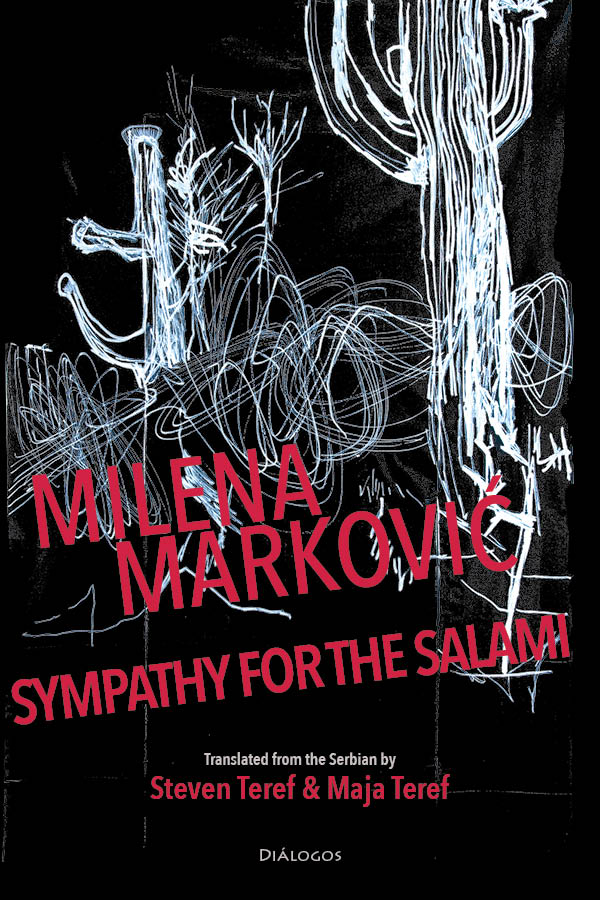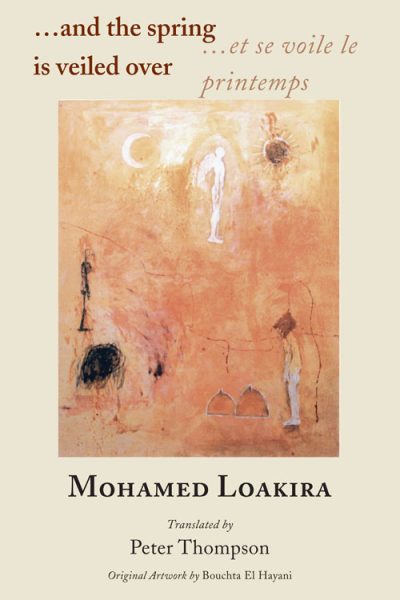Description
Milena Marković
Translated by Steven Teref & Maja Teref
sympathy for the salami
ISBN:978-1-956921-29-8
Paperback, 194 pages, August, 2024 (Pre-order sale pricing through July 31; ships in early August.)
Milena Marković is a city poet who revels in the crumbling concrete and smoked meat of Belgrade and other European metropolises populated by the addicted, the down-and-out, the mad, and the shady. sympathy for the salami selects work from her seven poetry collections, including excerpts from her novel-in-verse Children, which encompass the full range of her humor and terror. Her poems present a blemished nakedness in their candor about her drug-and-alcohol-fueled music scene days and their aftermath, as well as her life as a mother to a son with intellectual disabilities. Motifs of substance abuse, an unabashed love of meat, the dailiness of European urban life, childhood trauma, haunted dreamscapes, and the demands of motherhood permeate the work, steeped in the intricacies of Balkan culture. Readers of American poets as diverse as Anne Sexton and Charles Bukowski will find Marković’s confessional voice, while readers of Charles Simic will chuckle over her humorous voltas, fans of surrealism will feel at home in her dreamscapes, and Frank O’Hara devotees will appreciate her fresh portrayals of European urban dailiness.
Front Cover Art: Simonida Rajčević
Author Photo: ©Zoran Lončarević
In sympathy for the salami, we hear a vivid, honest, often funny, sometimes disturbing voice from this Serbian poet who confronts her life more directly than most of us have the courage to do. As she tells us, she writes for everyone, the living and the dead and those who won’t die, and for the children who “walk in the murk,” so they can find the way out of it. She herself is still in it, and she has learned that “the murk is not the worst place/the end is not the worst place/fear is.” Whether she is describing wild parties or delirium tremens, a love affair or her grandfather grabbing his granddaughters behind the house, even her ambivalent feelings toward the disabled son to whom she gave birth when she was not much more than a child, she remains fearless. At times, the rush of language and the bohemian scenes remind me of Frank O’Hara, at other times her despair makes me think of Billie Holiday greeting her heartbreak. But Milena Marković is very much her own self, and Maja and Steven Teref have found a muscular English to embody her voice and make us forget that she does not live just down the street.
—Susanna Lang, author of Travel Notes from the River Styx, and translator of My Soul Has No Corners by Souad Labbize
A bold dystopian account of a woman’s physical and emotional journey sans termination. The meat of Marković’s poetry is focused on the inner life of a woman coming of age in the traumatic post-conflict transition of the world around her. A torrent of disparate words laden with feelings of love, passion, fear, regret, sorrow, disillusionment—the pandemonium of a quotidian life. Her narrative is straightforward with no exposition. Her self-denunciation harsh, her language bold, her faculty of emotions immense. sympathy for the salami illustrates the author’s innovative style, which can be read as her appeal to reconcile with fate. Marković’s poems are a powerful read in any language you choose, even in one you do not understand. They contain a steady beat, the familiar cadence of a song or an epic—something that resonates with you long after you put the book down. Laurels to both the poet and the translators who provided us with this fine-tuned English edition of the original verses.
—Nada Petković, University of Chicago
Welcome to the brilliant, incisive, and feral world of Milena Marković’s poems, where the rats are “fat as piglets” and where we’re not afraid “to laugh at the wolf / to spit at the boar / to soar with the birds.” The brisk, hauntingly dreamlike narratives of sympathy for the salami remind us, poem after poem, how terrifying and exhilarating it is to desire and to be desired. Huge thanks to Steven and Maja Teref for this rich and evocative translation from the Serbian—for the care and mindfulness with which they cross
linguistic and cultural borders.
—Tony Trigilio, author of Craft: A Memoir
This book fits Richard Hell’s definition of punk: “anti-authority, independent, tricky, unsentimental, dirty, quick, subversive, guiltless.” I was mesmerized by the squalor of Marković’s Belgrade and the quickness and energy of her lines. But more than that, I was and am especially in awe, given that the book’s subjects are largely family and the past, of its unsentimentality and guiltlessness. These poems love only honesty. They will never stoop to comfort. Violence and impassivity are almost an aesthetic here. The past is present tense, and it’s met with curiosity and without apology: “my hair is filthy there is no water / my scalp is bleeding from scratching / I’m waiting for summer so I can wear a tube top / and go to the sava / they can keep bombing.” There seems no group to which this voice belongs—certainly not patriots, not academia though Marković is a professor, not mothers though she is one of those too—she does not even have a home among her beloved dead. The only institution that might claim her is poetry. But her hurtling and defiant poems show that she, like many great poets, is a stranger even there. So grateful to finally have this bilingual collection deftly translated by Steven Teref and Maja Teref, and yet beware, sympathy for the salami will only make you hungry for much more Marković.
—Darcie Dennigan, author of Madame X
In the hands of the brilliant translators, Maja Teref and Steven Teref, Serbian poet Milena Marković’s ambivalence about her hedonist and raucous “sex, drugs, and rock ’n’ roll” youth—“I dread the past / and sometimes yearn for it”—spirals wider and deeper into meditations on restlessness and recklessness throughout a lifetime. We need to take risks to stay alive, grow, and transform, even as doing so comes with dangers from without and from the self’s inclination to self-harm. Some of my favorite poems in this gritty and witty collection are the ones about the speaker’s devotion to food, which is perhaps the older self’s compromise with the younger. Many of these poems are epicurean, epistolary, elegiac, brutal, and tender in surprising turns—“is there anything more beautiful / than roast piglet.” For English language readers in the 21st Century, this collection is a must. It builds hyperlocal worlds, defamiliarizing to those of us in the so-called West, but simultaneously manifests hybrid, global worlds. The speakers allude to English language literature and the rhythms and icons of American popular culture, while challenging ‘us’ to see past our blind spots. Grab yourself a copy and hold on for the ride.
—Virginia Bell, Editor of RHINO Poetry, and author of Lifting Child from the Ground, Turning Around







Reviews
There are no reviews yet.